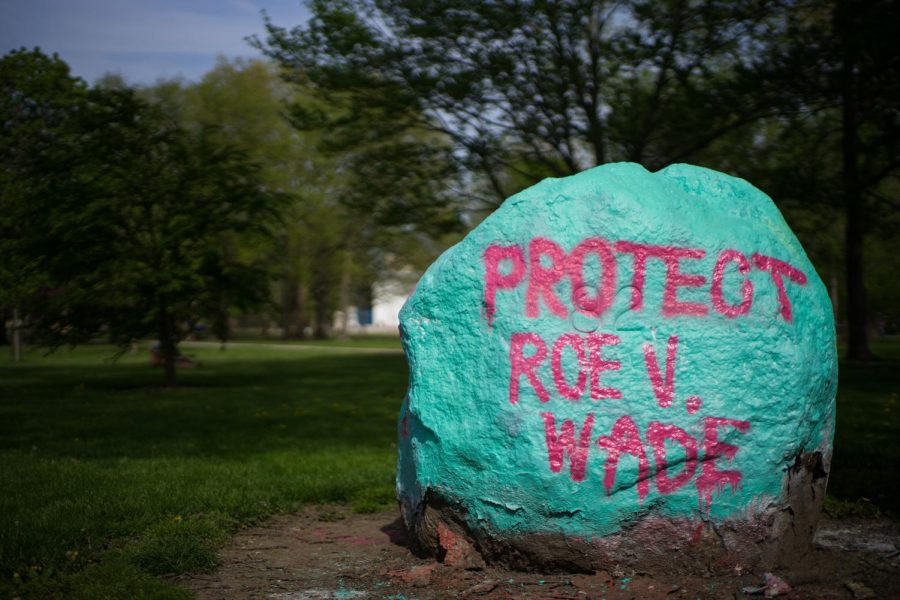Students Organize in Response to Potential Overturning of Roe v. Wade
Students painted a rock in Tappan Square with the slogan “Protect Roe v. Wade” after the Supreme Court leak.
A recently leaked draft of a Supreme Court majority opinion indicates that the Court may overturn Roe v. Wade. Such a decision would end the nearly 50-year-old precedent of the constitutional right to abortion. Spurred on by this possibility, Oberlin student activists are working to protect reproductive rights.
On May 5, roughly 40 students met in Wilder Hall to discuss how they could respond to the leaked opinion. Meeting attendees included representatives from various student-led sexual health organizations such as the Sexual Information Center, the Oberlin Doula Collective, Sexual Health Information Liaisons, and Survivors of Sexual Harm & Allies. Many students unaffiliated with these organizations, but inspired to act, also attended.
“Of all my time working with sexual information orgs, I have never seen them all in a room together,” said College fourth-year Colby Fortin. “I think that really speaks to the magnitude of this issue.”
The meeting resulted in the emergence of a coalition called Oberlin Students for Reproductive Justice. The group has developed an Instagram page, @obies4reproductivejustice, to update interested Oberlin students and community members on upcoming events and protests.
At the coalition’s Monday rally, roughly 80 people gathered at the Tappan Square Memorial Arch. Various students spoke at the demonstration, and organizers shared information about campus services, local abortion funds, and upcoming events.
At the rally, Dr. Pamela Brooks, professor of Africana Studies, reflected on life before Roe v. Wade.
“What I know well is the fear and panic of any of my generation felt upon hearing out mothers’ warnings: ‘You have no alternative if you come up pregnant, so don’t,’” Brooks wrote in an email to the Review. “It was truly a scary time.”
The coalition has also begun planning further activism, including a fundraising festival for reproductive justice at the end of May. The festival is inspired by protests from the ’60’s and ’70’s, which used music to connect and energize the crowd. The coalition would split collected funds between the National Network of Abortion Funds; Preterm, a non-profit sexual health clinic in Cleveland; and Indigenous health care funds.
The SIC is taking additional actions to respond to the leaked opinion. According to College third-year and SIC staff member Maya Yin Fahrer, the SIC has responded by adapting its stocking practices to the situation at hand.
“We are preparing for the worst,” she said. “We’re stockpiling Plan B.”
Other student organizations, including those not focused on sexual health, have also mobilized resources. Oberlin Hillel, a pluralistic organization for Jewish students, will provide transportation to Cleveland for individuals attending the May 14 “Bans Off Our Bodies” rally in support of reproductive health care.
After the suggestion of students, faculty from two academic departments have organized as well. Professors from the Gender, Sexuality, and Feminist Studies and the Comparative American Studies departments will host a teach-in May 17 to educate attendants on the leaked opinion’s implications for abortion access.
“Each organization is tackling different things, and together we can provide educational resources, political [action], and emotional support,” said College third-year Caitlyn Bull, a member of ODC and SOSHA leadership. “There is only so much one person can provide, which is why a collective movement is so important.”
Students interested in participating in reproductive justice efforts can contact oberlindoulacollective@gmail.com or direct message @obies4reproductivejustice on Instagram to join their email list or participate in the group’s fundraising festival. Students can also read the This Week section in this edition of the Review on page 8 for a calendar of events related to reproductive justice.







